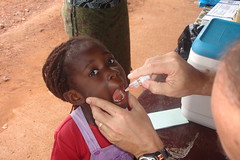WAPF: This is the 2nd annual project fair in West Africa. African Rotarians came to Accra from Ghana, Benin, Cote Ivoire, Nigeria, Togo, Liberia and Burkina Faso. International Rotarians came from the US, Canada, Netherlands (27!), Germany, the UK and Switzerland (me). I was disappointed to see that the Sierra Leone clubs did not attend, since I was hoping to discuss a project with my friends at RC Nyon-la-Cote in Switzerland.
The African clubs presented their projects to the visitors, to generate international projects, possibly involving Rotary Foundation matching funds through a WCS grant. In many cases though, the African projects would not be very expensive, especially if one of the donor clubs has expertise in a particular area such as water, or can access used school or medical supplies.
NID: Polio is almost eradicated in Africa, but close is not good enough. Ghana was certified as polio free a few years ago, but was reinfected by refugees. If no cases are found this year (the third year in a row), Ghana will be certified polio free again. Nigeria has been difficult, but NIDs there ought to clear Africa entirely. This year the Ghana NID included measles shots, vitamin A and anti-malaria bed nets as well as polio drops for children less than one year old.
The 2006 Ghana NID was funded by WHO, Ghana, the Japan Embassy and other NGOs besides Rotary [Many thanks to those of you who contributed to Polio Plus]. Ghanaian Rotarians provide organization and transportation, and bring in volunteers like us non-African Rotarians who want to see polio wiped out forever. Jerra Rowland, from my club of Cupertino CA, and I were part of a team that went to a neighborhood in Tema, Ghana. A public health nurse gave the shots but other tasks were done by us volunteers.
The mothers come voluntarily for the free treatments. They know polio since it has only recently been controlled here, but malaria is endemic. The DDT-impregnated bed nets were the most popular items. Polio is now a remote danger, but mosquitoes are everywhere and malaria is almost a certainty. The nets were given to mothers with children two years old and younger (but we didn’t ask for proof of age), since the disease is quite serious for infants.
Projects at WAPF: We all left with many proposals. Water and literacy, two central drives with Rotary now, were of concern with all African clubs. DG Russ Hobbs and I shared a room; we tried to define the problems in some coherent way, but the different parts are so tied together that I didn’t see a single approach. Water is tied to health is tied to population is tied to literacy…It’s all a knot. Choose a problem where you can help, and go at it.
Visiting an event like this made me appreciate how supported we are in the developed world by our infrastructure of education, government, and public health.
-- Dave Stearns, RC Cupertino CA D5170


0 Comments:
Post a Comment
<< Home